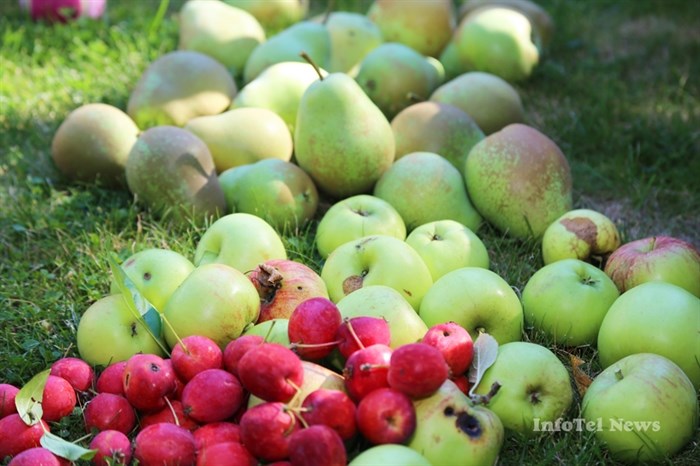
Pears and apples are being protected by the Sterile Insect Release program.
(JENNIFER STAHN / iNFOnews.ca)
January 30, 2019 - 6:30 AM
KELOWNA - Sterile codling moths are doing such a good job in the Okanagan, they may be exported south of the border.
But the primary focus will be to control – not eradicate – the codling moths at home in order to protect Okanagan apple, pear and quince crops from what’s commonly referred to as apple worms.
“The codling moth is a tough bug to fight,” Melissa Tesche, General Manager of the Okanagan Sterile Insect Release program told iNFOnews.ca. “It’s always just waiting to take off on you. It’s capable of explosive population growth and it’s our program’s job to suppress that growth and to stop or slow it.”
Because of so many backyard and wild apple trees in the Valley, it seems impossible to eradicate it here. Even if that could be done, importing infected apples or having moths cross the border from Washington State would set off new infestations.
And, keeping an active program may prove to be a great help to U.S. growers.
In the 1990s, the Okanagan fruit industry started the sterile codling moth program that floods orchards with sterile moths. Those interrupt the mating process and drastically cut the number of moths attacking fruit.
At the same time, the U.S. growers chose a “mating disruption” model, to flood orchards with the female pheromone and making it difficult for males to find female moths to mate with.
“It worked really well for a number of years,” Tesche said. “But, it doesn’t seem to be holding as well as it used to.”
That means growers have to find other methods of control. There are chemical sprays but it’s a real problem for organic growers who either have to pick off infected fruit or use a virus spray that is specific to codling moths. There’s concern that too much spraying of the virus will make it ineffective.
At a recent industry conference in Portland, Tesche found a growing interest in sterile codling moths.
Tesche will send some moths to Washington state to help with their research but has to keep enough moths on hand to deal with possible infestations at home.
But if all goes well, there may be a market to export sterile moths to the U.S. from the Osoyoos plant.
When the program began, there were 22,000 acres of apples in the Okanagan. That’s dropped to about 8,500 acres so there is excess capacity in the plant. If the plant could run at full speed, that would drop the cost per unit for Okanagan growers and bring in revenue.
The program is funded 40 per cent by growers and 60 per cent by taxpayers. There have been no tax increases for the last nine years.
While exporting sterile moths is one possibility for the program, using drones to deliver the moths may also bring new efficiencies.
The Okanagan program worked with the U.S. Department of Agriculture and private companies testing drones which are less harmful to the moths than existing delivery methods.
Currently, about 30 all-terrain vehicles are used each season to deliver moths through a blower system on the front of the ATVs. They hit orchards once a week but increase to twice a week when there are infestations.
Tesche is reviewing the new federal drone regulations and hopes to start off with one drone and build from there. Because of restrictions on drone use in certain air spaces, she expects some surface delivery will always be needed.
To contact a reporter for this story, email Rob Munro or call 250-808-0143 or email the editor. You can also submit photos, videos or news tips to the newsroom and be entered to win a monthly prize draw.
We welcome your comments and opinions on our stories but play nice. We won't censor or delete comments unless they contain off-topic statements or links, unnecessary vulgarity, false facts, spam or obviously fake profiles. If you have any concerns about what you see in comments, email the editor in the link above.
News from © iNFOnews, 2019